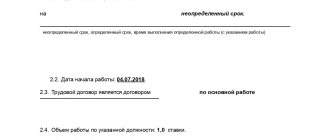Commentary to Art. 8 of the Criminal Code
1. The corpus delicti is a set of objective and subjective characteristics provided for by criminal law that characterize a socially dangerous act as a crime. Its presence in a specific socially dangerous act serves as a necessary and sufficient basis for bringing to criminal responsibility the person who committed this act.
2. The signs that form the corpus delicti are grouped according to the elements of the crime. In total, the crime consists of four elements: 1) the object of the crime; 2) the objective side of the crime; 3) the subjective side of the crime and 4) the subject of the crime.
3. The object of the crime is those social relations protected by criminal law that the crime encroaches on.
4. The objective side means the external manifestation of the crime in reality. It includes the following features: an act, socially dangerous consequences, a causal relationship between the act and its socially dangerous consequences, time, place, setting, method, instruments and means of committing a crime.
5. The subjective side of a crime is understood as the mental activity of a person directly related to the commission of a crime. The content of the subjective side of the crime is characterized by such legal features as guilt, motive and purpose.
6. The subject of a crime is a person who has committed a criminal offense and, in accordance with the law, is capable of bearing criminal liability for it.
Concept of criminal liability
The term “criminal liability” is used many times in various articles of the Criminal Code of the Russian Federation, in the titles of sections (section IV “Exemption from criminal liability and punishment”; section V “Criminal liability of minors”) and chapters (chapter 4 “Persons subject to criminal responsibility"; Chapter 14 "Peculiarities of criminal liability and punishment of minors") of the Code. However, the concept of criminal liability is not defined by law.
Criminal liability is a type of legal liability (along with civil, administrative, disciplinary and material).
Criminal liability as a category of criminal law is inextricably linked with crime. Criminal liability as a type of legal liability is the obligation to give an account specifically for a crime - a socially dangerous act committed guilty of guilt, prohibited by the Criminal Code of the Russian Federation under threat of punishment (Part 1 of Article 14 of the Criminal Code of the Russian Federation).
Criminal liability is the obligation provided by criminal law for a person who has committed a crime to bear responsibility for the crime committed and to suffer the negative consequences of his behavior imposed by the state in accordance with criminal law.
Other scientists the concept of criminal liability as a negative assessment of an act and the person who committed it on the part of society and the state, as well as the suffering of negative consequences by this person if a criminal penalty or other measures of a criminal legal nature are applied to him upon release from punishment. Moreover, in this context, release from punishment means release from punishment, release from serving a sentence and release from actually serving a sentence.
Second commentary to Art. 8 of the Criminal Code of the Russian Federation
1. The corpus delicti of a crime is a set of objective and subjective characteristics established by the Code that characterize a socially dangerous act as a crime. The element of a crime is understood as a generalized legally significant property specified in the law, inherent in all crimes of this type. The norms of the Special Part describe the characteristics that reflect the specifics of a particular crime; in the norms of the General Part of the Criminal Code - signs characteristic of all crimes without exception (the age at which criminal liability begins and sanity). The signs characterizing a specific crime form a system; the absence of at least one of them means the absence of the crime as a whole.
Thus, the corpus delicti allows us to determine the legal structure of a socially dangerous act and conclude that the latter is a crime provided for by the norm of the Special Part of the Criminal Code.
Other comments to Article 8 of the Criminal Code of the Russian Federation
‹ Article 7. The principle of humanismUpChapter 2. The operation of criminal law in time and space ›
Forms of implementation of criminal liability
The criminal law provides for several forms of implementation of criminal liability:
1) imposing a sentence to be served by the convicted person is the most common form of implementation of criminal liability. If a person is found guilty of committing a crime, he is given a guilty verdict, which imposes a punishment determined by a specific period and amount, which is a measure of state coercion and contains a restriction of his rights and freedoms. From the day the court's conviction comes into force until the criminal record is expunged or removed, a person convicted of committing a crime is considered to have been convicted (Article 86 of the Criminal Code of the Russian Federation). As follows from Part 6 of Art. 86 of the Criminal Code of the Russian Federation, only expungement or removal of a criminal record cancels all legal consequences associated with a criminal record provided for by the Criminal Code of the Russian Federation. The termination of a criminal legal relationship also means the termination of criminal liability.
2) assignment of punishment with exemption from serving it . The court may find a person guilty of committing a crime, sentence him, but release him from actually serving it. This form of implementation of criminal liability is:
- suspended sentence (Article 73 of the Criminal Code of the Russian Federation);
- exemption from punishment due to illness (Article 81 of the Criminal Code of the Russian Federation);
- release from serving a sentence upon expiration of the period of deferment of serving the sentence (Part 3 of Article 82 of the Criminal Code of the Russian Federation);
- release from serving a sentence upon expiration of the deferment of serving a sentence for drug addicts (Part 3 of Article 82.1 of the Criminal Code of the Russian Federation);
- exemption from serving a sentence due to the expiration of the statute of limitations for a court conviction (Article 83 of the Criminal Code of the Russian Federation);
- amnesty (Article 84 of the Criminal Code of the Russian Federation).
When applying these measures, the implementation of criminal liability consists of issuing a conviction, which reflects a negative assessment of the committed act on the part of the state, censure of the person who committed this act and the imposition of a punishment, which, on the grounds specified in the law, is not actually served. Termination of a criminal legal relationship and, therefore, criminal liability is associated with the timing of expungement or expungement of a criminal record, which depends on the type of measure applied. Thus, a person who has been given a conditional sentence (Article 73 of the Criminal Code of the Russian Federation) is considered to have no criminal record after the expiration of the probationary period (clause “a”, Part 3 of Article 86 of the Criminal Code of the Russian Federation). Persons released from punishment are considered to have no criminal record (Part 2 of Article 86 of the Criminal Code of the Russian Federation). Thus, a person released from serving a sentence due to the expiration of the statute of limitations for a court conviction is considered not to have been convicted after the expiration of the statute of limitations.
3) conviction of a person without imposing punishment . The court, having found a person guilty of committing a crime, makes a guilty verdict without imposing punishment. The implementation of criminal liability in this case consists of issuing a conviction, reflecting a negative assessment by the state of the committed act and censure of the person who committed it. In this form, the implementation of criminal liability occurs upon release from punishment due to a change in the situation (Article 80.1 of the Criminal Code of the Russian Federation), as well as release from punishment of minors (Article 92 of the Criminal Code of the Russian Federation). Criminal legal relations and criminal liability cease with the court's verdict of guilty.
Financial liability to the employee
Financial liability is when an employer pays money to an employee for illegal dismissal, delayed wages, damage to property and violation of other rights.
Here's what the employer is specifically responsible for:
Lost earnings for deprivation of the opportunity to work - Art. 234 Labor Code of the Russian Federation.
If an employee is left without a job or does not get a new one due to violations of the law by the employer, he receives a salary. The money is paid for the entire time the person did not work.
Lost wages are due for:
- dismissal without reason - fired for absenteeism, although the person was at a session at the university;
— transfer to another job without the employee’s consent — a restaurant administrator was demoted to a food delivery courier;
- failure to issue a work book on the day of dismissal or an error in the entry - a person will not be hired without a work book, and the wording of the dismissal can harm the reputation.
Interest for delay of money - Art. 236 Labor Code of the Russian Federation.
A person is given a salary on the dates specified in the employment contract. Upon dismissal, the remaining salary and vacation compensation are paid on the last working day. There are other payments: for working at night or using a personal laptop in the office. All payments have exact deadlines.
For violation of deadlines, the employer pays the employee interest. The amount is 1/150 of the key rate of the Central Bank of the Russian Federation of the unpaid amount for each day.
Compensation for damage to employee property - Art. 235 Labor Code of the Russian Federation.
It happens that an employee uses personal property at work.
When an item is lost or damaged due to the employer's fault, the employee receives money or an equivalent item. To do this, the employee writes a claim for damages. The employer sorts it out within ten days, pays the money or refuses. The refusal does not prevent the employee from going to court.
The woman worked at the hospital as an exercise therapy instructor. On one of the shifts, the orderly, on the instructions of the head nurse, threw out jeans, a jumper and a shawl from her personal closet. The reason was explained by the fact that the things were lying together with overalls, and this is not allowed.
The exercise therapy instructor went to court and sued the hospital for the cost of the clothes, and on top of that there was also money for moral damages, lawyer’s fees and product examination.
According to SanPiN for medical institutions, a personal closet must have two sections - for separate storage of personal and work clothes. The hospital management did not take care of such cabinets. The employer is at fault in the incident with the thrown clothes, so he is obliged to compensate the employee for damages - case No. 33-511.
Average earnings during suspension of work due to delayed wages - art. 142 Labor Code of the Russian Federation.
When there is no salary for more than 15 days, the employee has the right not to go to the workplace. He is only required to warn management in writing.
A person is required to go to work the next day after notification of readiness to transfer money.
The time of such a “strike” is not absenteeism and the entrepreneur pays the employee the average salary.
Registration of an employee
The court reinstates an employee who was fired illegally. The entrepreneur will have to look for a new basis for terminating the employment contract. In the meantime, he’s looking to pay his salary.
The court turns work in the state disguised as a contract into an employment contract under Art. 19.1 Labor Code of the Russian Federation. For the past time, obliges to transfer contributions to social security.
The court obliges the court to conclude a fixed-term employment contract without economic need or consent of the employee for good under Art. 58 Labor Code of the Russian Federation.
Formally, forced registration of an employee on the staff does not apply to financial liability. But in such situations, entrepreneurs lose money and get an unwanted employee into the business.
Compensation for moral damage - Art. 237 Labor Code of the Russian Federation.
People are worried about violations of labor rights. The salary was delayed - I had to step over myself and borrow from a friend.
The employer is obliged to compensate for the worries with money. The amount of compensation is as agreed by the parties. If an agreement cannot be reached, the court will determine the amount.
The employer's financial responsibility can be increased in the employment contract. For example, increase the percentage for late wages. But you can’t downgrade or cancel it at all. This is the rule from Art. 232 Labor Code of the Russian Federation.
Ideally, the employer pays the money at the request of the employee. I gave my work book two weeks later and paid half the salary for my inability to get a new job. In reality, violations of workers' rights usually result in a fundamental dispute and litigation. In the end, the employer pays the money according to the court decision.
The entrepreneur hired a cashier at the store. According to the employment contract, the cashier received a salary of 11,000 rubles, and according to the additional agreement, a percentage of sales. Apparently, there was also a verbal agreement and in fact the woman received only a percentage of sales. And they didn’t even transfer taxes from the official salary. After nine months, the cashier resigned of her own free will. The entrepreneur did not formalize the dismissal, did not issue a work book, and did not pay wages or compensation for vacation. This turned out to be reckless.
The cashier went to court. We were suing for more than a year, the debt and interest grew like a snowball. As a result, the employee received:
— 103,586 ₽ — unpaid wages;
— 6,771 ₽ — compensation for vacation;
— 28,280 ₽ — interest for delayed salaries;
— 50,000 ₽ — compensation for moral damage;
— 169,888 ₽ — lost earnings due to an unissued work book.
The court also ordered the entrepreneur to transfer personal income tax and contributions to the Pension Fund - case No. 33-11587/2018.
Such amounts in favor of the employee are a common outcome of a labor dispute in judicial practice. The scale of the employer’s business and money turnover do not matter to the court.








